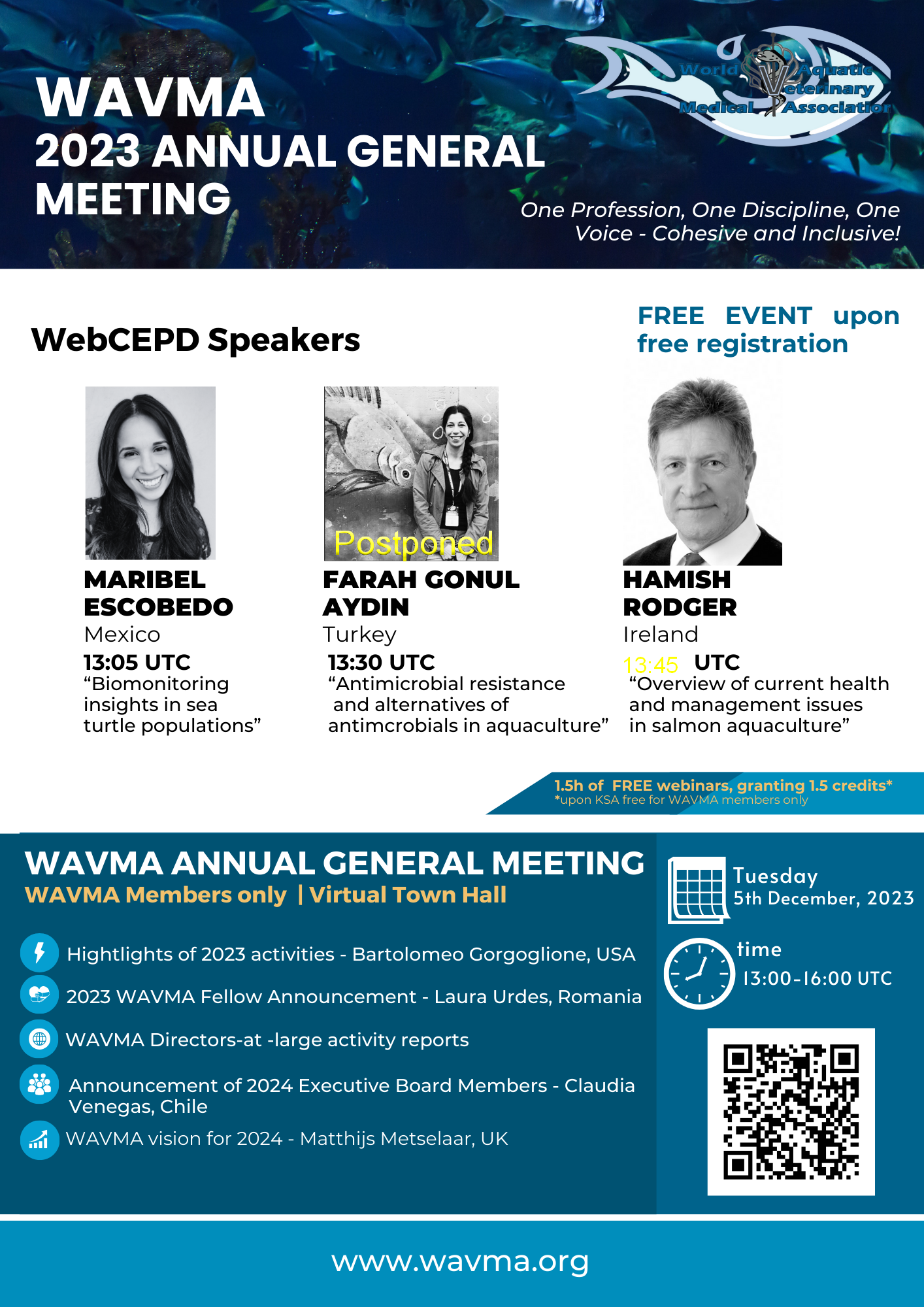B-1076 B-1077: Special WebCEPD event and WAVMA AGM 2023
Presenter: Dr. Hamish Rodger and Maribel Escobedo Mondragón
Date: December 5, 2023 Time: 01:00 PM UTC
CEPD credits are available for this event
Costs for training: Free to full members, Free to student members, Non member/guest: $15
Already a WAVMA member?
Log in to your account
Not a WAVMA member?
Create a guest account to access this course
with more information about what it means to sign up as a WAVMA member.
More about this event
B-1076: Overview on the current main health and management issues in salmon aquaculture, Hamish Rodger, Ireland
Dr. Hamish Rodger graduated from the Uni. of Glasgow (1984). He has a MSc and PhD from the University of Stirling. Following work in academia (Uni. Stirling & UPENN) & aquatic animal vet practice he established and operated an aquatic animal health consultancy which merged into PatoGen AS www.patogen.com where he serves as Chief Fish Health Officer and provides diagnostic services, consultancy, training and veterinary services to aquaculture companies on a global basis and is involved in aquaculture research.
Salmon aquaculture faces a myriad of health challenges with infectious, non-infectious diseases and complex issues emerging. Learning Objectives:
- Understand salmon farming health priorities
- Awareness of gaps in knowledge
- Understand need for vets in salmon aquaculture
B-1077: Bio-monitoring insights in sea turtle populations, Maribel Escobedo Mondragón, Mexico
Maribel Escobedo is a dedicated wildlife professional based in Quintana Roo, Mexico, candidate to a Ph.D. in Animal Science for Wildlife Management from the National Autonomous University of Mexico (UNAM). She obtained her Master's degree in Wildlife Medicine in 2019 and is a WAVMA Certified Aquatic Veterinarian (CertAqV). Escobedo specializes in ecotoxicology for biomonitoring programs, and sea turtle medicine & rehabilitation. Currently, she is serving as a technical advisor for sea turtle conservation programs, and actively involved in professional organizations, in which holds leadership positions related to Sea Turtle Protection and Conservation, in Mexico and for the Latin American region and is active member as Leader of the Student Support Subcommittee of the WAVMA Education and Students Committee.
Advancement of industrial and new technologies, and its waste disposal into coastal waters have resulted in marine ecosystem changes. Inorganic elements as pollutant compounds are a global concern due to their potential toxic effect, persistence, and ability to bioaccumulate in aquatic ecosystems. Biomonitoring programs has become a useful tool for the development of preventive strategies against environmental impacts and climate change in the marine ecosystems. Since 2017, the “Biomonitoring program in Yucatán Peninsula”, had been collaborate with multiple sea turtle conservation programs, to understand the impact of emerging inorganic compounds, causes of strandings, mortality and other anthropogenic impacts on the region. Learning Objectives:
- Understand what a biomonitoring program is
- Get to know some activities of a wildlife veterinarian
- Learn about inorganic pollutants
